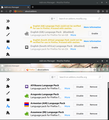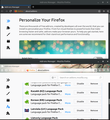
Too many language packs installed
There are too many language packs (maybe all) installed on one of my profiles. Why or how that happened? How can I remove all of them except the one I use without having to click like 100 time on the Remove button? Also on another profile there are only two language packs, but they could not be verified for use in Firefox, and I don't see an option to remove or to update them, only the option of disabling them. What's going on here?
Isisombululo esikhethiwe
You can find the install location of a specific extension in the extensions.json file in the profile folder. You can open the extensions.json file in the Scratchpad and search for this extension. You can use the Scratchpad to inspect the extensions.json file.
- "3-bar" menu button or Tools -> Web Developer
- click the "Pretty Print" button to format the file for readability.
The builtin JSON viewer collapses all records by default and is less useful although the Search bar works.
You can search for langpack The path field should list its install location (full path to .xpi file).
You can use the button on the "Help -> Troubleshooting Information" (about:support) page to go to the current Firefox profile folder or use the about:profiles page.
- Help -> Troubleshooting Information -> Profile Directory:
Windows: Show Folder; Linux: Open Directory; Mac: Show in Finder - http://kb.mozillazine.org/Profile_folder_-_Firefox
All Replies (9)
So what version of FF did you install?
Okulungisiwe
That is part of the modifications Ubuntu makes to its special branded Firefox version and include a lot of locales (language packs). Easiest is to use the Firefox version from the Mozilla server.
cor-el said
That is part of the modifications Ubuntu makes to its special branded Firefox version and include a lot of locales (language packs). Easiest is to use the Firefox version from the Mozilla server.
Can I use it alongside the one from the repositories?
EDIT: But, still, doesn't the version from the server have the same issue if I use it with those profiles?
Okulungisiwe
No you can not use it along side as well version 61 was released today.
No, your site/s as was said can load language packs into it for world wide distribute of it. Mozilla's servers have language separate for all countries, so download what you want then can add a language pack if you want another, as well as a dictionary for spell check.
Language to the left, Dictionaries to the right :
and always :
- https://support.mozilla.org/en-US/kb/back-and-restore-information-firefox-profiles
- https://support.mozilla.org/en-US/kb/export-firefox-bookmarks-to-backup-or-transfer
Please let us know if this solved your issue or if need further assistance.
@Pkshadow: I think I'll let everything as is (many language packs installed on a profile, and two disabled and unverifiable on another), because I want to keep those profiles (I used them for at least two years already), and because I want to benefit from updates done through OS tools.
Maybe the problem lies in the fact that I'm using those profiles with FF instances from different OSes. Anyway, I thought that was the main reason why a profile was designed: to be able to use it no matter what FF version is managing it. But maybe I got it all wrong.
The only questions that bothers me are: Are those language packs installed into a profile, or into Firefox configuration folder? How can I get rid of something that can't be verified?
Okulungisiwe
As said the Language Packs you have was likely installed in the package manager with the Ubuntu build of Firefox 60.0 you have. So you may be able to remove the Language Packs in the package manager when Firefox is closed.
Firefox from www.mozilla.org/firefox/all (including Linux) does not come with any Language Packs like the ones listed on right side of https://addons.mozilla.org/firefox/language-tools/
James said
As said the Language Packs you have was likely installed in the package manager with the Ubuntu build of Firefox 60.0 you have. So you may be able to remove the Language Packs in the package manager when Firefox is closed.
@James: In the package manager there was only one language pack installed: en-US. I uninstalled it, and the profile who previously had two unverifiable language packs has none now (the Languages section is missing completely from the Add-ons Manager), while the other profiles still have all of the language packs installed (it seems so judging by the presence of Disable and Remove buttons), although there is not a single one installed from the repository.
Anyway, thanks for your input, because now at least I don't see that annoying "Proceed with caution" warning anymore.
Isisombululo Esikhethiwe
You can find the install location of a specific extension in the extensions.json file in the profile folder. You can open the extensions.json file in the Scratchpad and search for this extension. You can use the Scratchpad to inspect the extensions.json file.
- "3-bar" menu button or Tools -> Web Developer
- click the "Pretty Print" button to format the file for readability.
The builtin JSON viewer collapses all records by default and is less useful although the Search bar works.
You can search for langpack The path field should list its install location (full path to .xpi file).
You can use the button on the "Help -> Troubleshooting Information" (about:support) page to go to the current Firefox profile folder or use the about:profiles page.
- Help -> Troubleshooting Information -> Profile Directory:
Windows: Show Folder; Linux: Open Directory; Mac: Show in Finder - http://kb.mozillazine.org/Profile_folder_-_Firefox


